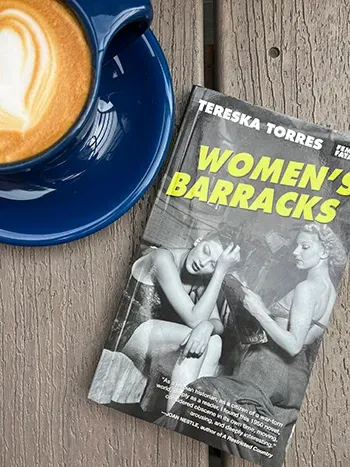WOMEN'S BARRACKS
TERESKA TORRES
© 2012 The Feminist Press
© 1950 Tereska Torres
$13.95
182 pages
Content warning: suicide, self-harm, pedophilia, sexual assault
When I picked up Women's Barracks, with its sexy, lingerie-clad soldiers exchanging sultry looks under heavy lashes, I was expecting a fun romp through the first Lesbian pulp fiction published in America. I wanted chain-smoking vixens and swaggering butches, maybe punching a Nazi or two before consummating their forbidden love with a shag in the bomb shelter.
This is not that.
This was sad, unsettling, unnerving, and (did I mention?) so sad. It was also real to the experience of Queer women in the 1940s and, if that doesn't give it away, I would like to emphasize again: it's a bummer.
To summarize, Tereska Torres, the author and semifictionalized narrator, joins the Free French Forces in London, where she is put in a room, dubbed the "Virgin's Room," with a few other girls. The rest of the story generally follows their romantic affairs (Queer and straight) throughout the war.
One woman becomes a pedophile because she had an abortion. Another attempts suicide and permanently injures herself after being assaulted for years by her guardians – but don't worry, because, in the words of our narrator, she only did it out of "a need for drama." Finally, a pregnant woman takes her own life days after the war has ended.
When the narrator was not being an incel, I did find myself pitying her from the parts of my younger, closeted self that related to how she was speaking. While Torres did not identify as Queer during her lifetime – and married two men – she spends paragraphs detailing the bodies of her friends, the exact shape of their breasts, and the curves of their hips. She lingers lovingly on how they look as they lie naked in front of fires, their glowing eyes, and the softness of their skin. Over and over again she writes how kissable her friend's lips are: Jacqueline's are "as soft to the eyes as they would be to kiss," and Mickey's are "constantly ready to be kissed."
Her descriptions of men are... not that. She focuses on their clothes, the stripes indicating rank, and such details as that one didn't take his shirt off during sex. The physical description we get at most is that one is "tall" – coincidentally the same answer a closeted teenage me gave when asked what I looked for in men.
More tellingly, none of the women really want to have sex with men. When they do, it's almost out of embarrassment that they haven't, something to check off the list so they can become "a real woman." In their liaisons with men, they're thinking of their women friends, and how sleeping with a man will make them closer to their women friends or more like them.
The most beautiful woman of the group, Jacqueline, comes the closest to lust. She's deeply infatuated with a man, but it's because he's married and unattainable. She treats it as a game in which she wishes to conquer said man, and, when she finally gets into a long-term relationship with a different, also married man, she's delighted he doesn't want to have sex with her, because, while she enjoyed the chase, she doesn't want to have sex with him either.
This is all as is to be expected, according to Torres, who also rejected reviewers describing her book as Queer literature because "only one and a half of them can be considered Lesbian." Thinking about your women friends while forcing yourself to have sex with men, dwelling on their kissable lips, choosing unattainable men to fantasize about, thinking of sex with men as a game (at most gymnastics), and believing it natural that only women would be capable of having tender, enjoyable sexual encounters... that's how straight women think, right?
What I'm reading to get over this: One Last Stop, by Casey McQuiston
Red, White and Royal Blue just came out on Amazon Prime, reminding me of Casey McQuiston's other work, the excellent One Last Stop, the book that started my love affair with the rom-com genre. It is cute and happy, and requires none of the content warnings that Women's Barracks does.
Up next: Spring Fire, by Vin Packer
This a fictionalized account of an affair between sorority sisters, based on the author's experience. A Queer relationship in the 1950s – what could go wrong?


